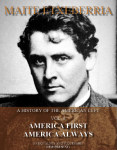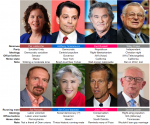- Location
- Op een dag, Nederland.
- Pronouns
- she/her & ne/nem
Democratic Choice is a left-wing socialist party that emerged out of the decades-long alliance between the primary left-wing parties of the post-Exchange America, the Green Party and the Radical Party. The Green Party emerged out of middle-class anger at the Social Conservatives and a wish to embrace a much more left-wing agenda, especially amongst the younger middle-class people who always opposed the Soc-Cons and thus voted for the centrist Forward in Unity and then their successor the broad-tent Reform Party.
The Radicals on the other hand, emerged out of working-class anger at the system itself and at the Third Great Depression (after the 1920s one and the 1960s one) caused by the Exchange. The Radicals were more willing to damn the system and burn everything down in the pursuit of socialism, while the Greens always carried a sense of "bourgeois socialism" to them, a middle-class attitude that although they gladly signed up to socialism and its ideals, guided them to a much more moderate path than many Radicals would like.
But back in 1984, there were other forces seeking to exploit people's anger, including outright fascists, theocrats and "merely" hardline nationalists, and the two parties agreed to form an electoral pact to present an united left-wing platform. This included an united ticket of Radical Tadeo Murillo and Green Arya Moon - the idealistic and charismatic elder statesman and the young but pragmatic Governor of California. The ticket won the election and faced the struggle of the next eight years together. As Murillo was shot and Moon became an incredibly transformative president, the electoral pact increased in its closeness and in 1992, was formalised as Democratic Choice.
Joining them was the party both of them split off, the broad-tent Reform Party, by then a rapidly shrinking party and increasingly incoherent as the people who were left were firmly left-wing people who thought the Radicals were upstarts and centrists who thought the Greens were too left-wing. By the end of the century, the party would disband and be split up between Radicals and Greens. The DC dominance of American politics enabled them to 24 years of almost uninterrupted success [excepting the National Alliance winning 1992 with a Third Way candidate] but in the end it would all come falling down in 2008 as the coalition turned on to itself.
President Robert Cermak, first elected in 2004, was a former Reformist and implemented centrist economics, including tax cuts for corporations which offended the Radicals' sensibilities and led to their founder Marcus Julian Watson announcing that he would seek to withdraw the Radicals from Democratic Choice, which in turn led the Greens to panic and pressure Cermak into compromising with the Radicals. Unfortunately, the president they helped elect in 2004 was a stubborn maverick who refused to compromise on his policies and immediately declared that he was seeking a second term as an independent, ripping the coalition apart in the process. Greens were split on if they would support Cermak or the person the DC ended up nominating in 2008, the Radical William Blaine. In the end, the Greens lost a lot of seats thanks to this, which led to discontent in DC's ranks and accusation that the Radicals "sabotaged" it all, which would take a while to heal.
President Henry E. Rockefeller was the first conservative president in 24 years [not counting the moderate President Kate Barclay from 1993 to 1997] and he proved an ideal scapegoat to distract the Democrats from factional bickering, what with his scandalous term and the perception that he was dismantling all that the Democrats established in their era of dominance, with even fearmongering being used - "Rockefeller will dismantle Americare!" being a popular one. In the end, the midterms proved to give them some gains but not enough. And then came 2012.
In 2012, the Democrats nominated the second Radical in a row, former Senator John Malone of Iowa. The convention almost nominated someone who was a radical for the Radicals, Fred McCombs, but the Greens rallied behind the more "moderate" Malone who promised them cabinet posts and was a distinct break from past Radicals. The Radicals in the past tended to be primarily labor unionists and slightly social conservative, but Malone was a heavily socially-liberal intellectual who knew how to convince unsure Greens that he was indeed their man, and to his credit, he did unite the coalition more than anyone else could and led it into the election and to the narrowest of defeats possible.
Rockefeller's second term proved to be a gruelling one for the Democrats as the rise of Our Millennium, a movement based around radical democratic reform, ending control of "dynasties" in politics, cleaning Washington corruption out and broadly socially-liberal centrism, cut heavily into the Green vote-share and led to more factional bickering as the Radicals were by then the biggest party in Congress while the Greens were struggling to stay above five percent (the share needed for proportional seats). The idea of merging the parties to bypass the factional tensions and to highlight unity became more popular at this time and a commission was set up to look into the idea in summer 2016.
President Sam Husain, unexpectedly thrown into the office after the deaths of Rockefeller and his vice-president Alois Krause, proved to increase the Democrats' disunity even more as part of his tripartisan cabinet, he appointed Greens to his cabinet which led to some saying the Greens should work with Our Millennium instead of the Radicals. Clearly the coalition was falling apart.
And then the Democrats elected to nominate the third Radical in a row, but just like Malone, this was no "standard" Radical. Najat Belkacem was Malone's campaign manager in 2012, and carried on his "liberal-socialist" ideals that she genuinely believed could unite the coalition and lead them to victory, or at least a strong result. In the end, they got a very close third place, just a few thousand votes from getting into the runoff, and endorsed the eventual winner, Vice-President Angie Bennett.
On paper, the result downballot looks awful for the Green Party, with them falling below 5% for the first time and only getting four Congresspeople, but by this point the Greens and Radicals were mostly running as Democrats downballot and the four Greens elected were those who chose to run as specifically Greens. The result for the Radicals includes many Greens who ran as Democrats instead, a test for the party merger that came less than two years later after many haggling and negotiation between the two sides, that ended up with more Greens in leadership positions than expected for their small size, something often attributed to a few facts - the Radicals wanted an amenable merger, the Greens were overall pretty nervous about their future and wanted a big slice of the new party's future in exchange for their agreement and they still had more Senators than the Radicals so they still had clout despite their decreasing House results and overall popularity.
With President Bennett and Our Millennium's popularity in doubt after the terrorist attack in California, the now fully-united Democratic Choice prepares to fight like they've always done, for justice, equality and socialism. And who knows, in 2020 maybe they can make history and elect the first president who is just simply a Democrat, not a Radical or a Green. A lot of them are eager and willing for that to be them.
Last edited:








